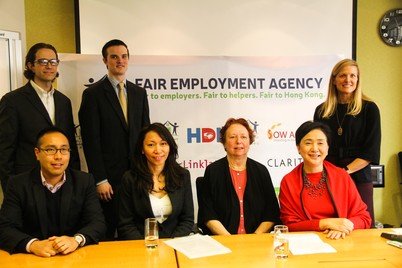Domestic Helpers Get an Alternative
Foreign domestic workers in Hong Kong come from developing Asian countries in pursuit of jobs to help support their families at home. Unfortunately, to secure these jobs the workers often have to pay significant and often illegal placement fees, which leave them deep in debt and reluctant to walk away, even if abused by their employers.
Foreign domestic workers in Hong Kong come from developing Asian countries in pursuit of jobs to help support their families at home. Unfortunately, to secure these jobs the workers often have to pay significant and often illegal placement fees, which leave them deep in debt and reluctant to walk away, even if abused by their employers. In Hong Kong alone, foreign domestic workers pay approximately HK$700,000,000 each year in placement fees.
A new social enterprise co-founded by David Bishop of the Faculty of Business and Economics is seeking to change that situation by removing those placement fees.
"There are a lot of NGOs doing amazing work to help domestic workers after they have problems. I wanted to start a business that would stop the problems from occurring in the first place," he said.
Working with Tammy Baltz, an expert on domestic helper exploitation issues, and Scott Stiles, a recent finance graduate from an American university, Mr Bishop set up the non-profit Fair Employment Agency (FEA). The former Asia Regional CEO of Grameen Foundation, Jennifer Meehan, has also come on board.
FEA's business model is simple: it follows the International Labour Organization’s guidelines to never charge a placement fee to the migrant worker. Instead, FEA only charges the employers. This means workers arrive without this burden of debt. The agency looks after paperwork, finds suitable candidates, and arranges interviews between employers and workers. The match between an employer's needs and worker's abilities is important because mismatches can end in poor relationships and terminated contracts.
The agency also receives donations which are invested back into its operations. Undergraduate students in Mr Bishop's social venture internship course help to staff the agency and provide leadership input on such things as business development, marketing and human resources.
"We're trying to provide a platform that is not only a successful social business but also shows that you don't have to focus only on the bottom line, because the aim of business is to make society better," he said. This is strengthened by the fact that FEA does not have to charge employers a premium for its services. FEA's placement fees are market rate for employers, making it easy for them to choose to do the right thing by working with FEA.
The agency has been targeting multinational corporations in particular, which see benefits for their corporate social responsibility agendas. Governments are also in its sights, and representatives of the Hong Kong, Indonesian and Philippine governments attended the official launch in February this year (the soft launch started last September).
The government originally admitted foreign domestic workers in the 1980s to help boost Hong Kong’s economy, particularly to help more women enter the work force. Their plan worked, dramatically increasing duel income families, and contributing significantly to Hong Kong's economic development. But economists forecast that the need for foreign labour will only increase, as Hong Kong’s population is aging rapidly. "Domestic workers will play an increasingly important role in Hong Kong’s economy over the next twenty years. More migrant labours are needed to fill the looming labour gaps," Mr Bishop said.
The Fair Employment team hopes to expand FEA's focus to include other migrant workers in the region and to other countries that import or export labour. "Workers' rights is something that a lot of governments are looking at and want to see improved as badly as I do. This also represents one of the most serious women’s rights issues in Asia right now. FEA can't change things by itself but we hope we can initiate change," he said.



